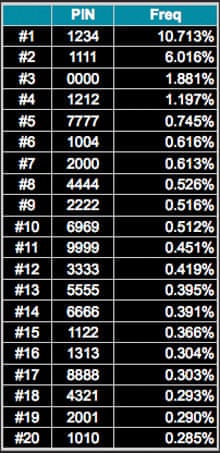What are the general criteria for rejecting an insecure PIN to access a building?
There has been a lot of discussion about password selection security. Minimum length requirements, mandatory classes of characters, etc. I have not found much concerning PIN selection security. Furthermore, there are several types of access that a PIN protects (phone, credit card, building). Each may have their own particular vulnerability characteristics.
I am in the loop on the installation of a new security system which allows personnel to enter a building by entering a PIN on a keypad by the door. Individuals are allowed to select their own PIN which is entered into the system under their name. I am aware of some insecure PINs, such as 12345 (or any consecutive digits sequence), the location's zip code or part of the company's phone number or address.
Anyone with a legitimate need may request access to the building. This includes everyone from executives to employees and and perhaps occasionally, guests. This particular building is a church, so there are no national secrets to protect. I would characterize the security requirements to be similar to a house. Interior offices are protected with physical keys.
Edit: I appreciate the information presented, however, they don't answer the question. I am looking for PIN patterns that attackers are known to use (because users have selected bad PINs).

